ISLAMABAD: Pakistan is doing “our best” to improve counter-terror financing operations in line with an internationally agreed action plan, the finance ministry said on Saturday, a day after global watchdog, the Financial Action Task Force, gave Islamabad until October to complete the program.
Since June last year, FATF already has Pakistan on its “gray list” of countries with inadequate controls over curbing money laundering and terrorism financing. On Friday it said it was concerned Pakistan had failed to complete the agreed action plan first by a January deadline and then again by a May deadline.
If Pakistan does not comply with an agreed action plan by October this year, it could likely result in sanctions, which would hurt the country’s economy and exports. FATF will formally announce its decision in Paris after a plenary that starts on October 13.
“We are doing our best to implement the action plan agreed upon with FATF,” Dr. Khaqan Hassan Najeeb, Finance ministry spokesman, told Arab News.
“FATF strongly urges Pakistan to swiftly complete its action plan by October 2019 when the last set of action plan items are set to expire,” the watchdog said in a statement on Friday. “Otherwise, the FATF will decide the next step at that time for insufficient progress.”
Khurram Husain, business editor for Pakistan’s Dawn newspaper, said it seemed that Pakistan had been given one last chance to deliver on specific conditions laid down by the FATF.
“In the case of failure, it looks likely that there will be blacklisting of Pakistan in October,” he said, adding that being placed on the blacklist would make the country’s economic interactions with the outside world “very expensive.”
“At a time when the country is struggling to revive its exports, this [the blacklisting] will be yet another hurdle,” Husain said.
According to the 36-nation FATF charter, the support of at least three member states is essential to avoid blacklisting. India – Pakistan’s arch-rival and co-chair of the joint group of FATF and Asia Pacific Group – has been pushing for Islamabad to be downgraded from a grey to a black list.
FATF and other world powers have been pushing Pakistan since 2015 to initiate anti-money laundering and terrorism financing actions but “we have not been able to undertake them,” Dawn’s Husain said.
“Now there is a last chance that has been given [to Pakistan], and we have a few months to do what we have not been able to do in the last four years.”
FATF, he said, would no longer be satisfied with Pakistan simply “passing laws and regulations … [but was] looking for specific actions on the ground against specific entities.”
“We want Pakistan downgraded on the FATF list,” Indian Finance Minister Arun Jaitley told reporters in May.
The call came a day after India claimed a diplomatic victory with a UN Security Council committee blacklisting the founder of the Pakistan-based Jaish-e-Mohammed (JeM) militant group, Masood Azhar.
His group claimed responsibility for a February suicide bombing that killed at least 40 Indian paramilitary police in the Indian-controlled part of the disputed Kashmir region, an attack that brought the nuclear-armed neighbors to the brink of war.
Pakistan’s ally China had repeatedly opposed efforts at the United Nations by Western powers to directly sanction Azhar, even though the group had already been blacklisted by the UN Security Council in 2001.
Azhar’s freedom within Pakistan has been a sore point in the relationship between Western countries and Pakistan, and has led to repeated accusations by India that Islamabad uses and harbors militant groups to further its foreign policy agenda. Pakistan denies such accusations.
Senior columnist Mosharraf Zaidi said there was no imminent chance of Pakistan being blacklisted by FATF but urged the government to address the “factors” which had led to the country being included in the grey list.
“This [blacklisting of Pakistan] is not going to happen anytime soon as they [the world powers] still need Pakistan to do a lot for them [for peace in Afghanistan],” he told Arab News, referring to Pakistan’s role in a negotiated settlement to a 17-year-long war in neighboring Afghanistan. However, he cautioned that being put on a blacklist would stand “in the way of economic growth” and Pakistan should take FATF-defined actions in the national interest.
FATF has asked Pakistan to work on implementing its action plan to address its strategic deficiencies, including by: (1) adequately demonstrating its proper understanding of the TF (terror financing) risks posed by the terrorist groups , and conducting supervision on a risk-sensitive basis; (2) demonstrating that remedial actions and sanctions are applied in cases of AML/CFT (anti-money laundering/counter terrorist financing) violations, and that these actions have an effect on AML/CFT compliance by financial institutions; (3) demonstrating that competent authorities are cooperating and taking action to identify and take enforcement action against illegal money or value transfer services (MVTS); (4) demonstrating that authorities are identifying cash couriers and enforcing controls on illicit movement of currency and understanding the risk of cash couriers being used for TF; (5) improving inter-agency coordination including between provincial and federal authorities on combating TF risks; (6) demonstrating that law enforcement agencies (LEAs) are identifying and investigating the widest range of TF activity and that TF investigations and prosecutions target designated persons and entities, and persons and entities acting on behalf or at the direction of the designated persons or entities; (7) demonstrating that TF prosecutions result in effective, proportionate and dissuasive sanctions and enhancing the capacity and support for prosecutors and the judiciary; and (8) demonstrating effective implementation of targeted financial sanctions (supported by a comprehensive legal obligation) against all 1267 and 1373 designated terrorists and those acting for or on their behalf, including preventing the raising and moving of funds, identifying and freezing assets (movable and immovable), and prohibiting access to funds and financial services; (9) demonstrating enforcement against TFS violations including administrative and criminal penalties and provincial and federal authorities cooperating on enforcement cases; (10) demonstrating that facilities and services owned or controlled by designated person are deprived of their resources and the usage of the resources.
Pakistan says doing “our best” to curb terror financing as per FATF action plan
Pakistan says doing “our best” to curb terror financing as per FATF action plan

- Global watchdog gives Pakistan until October to improve counter-terror funding operations or face action
- Failing to complete action plan could lead to blacklisting and likely result in sanctions
Heat wave cancels lessons for half Pakistan’s schoolchildren
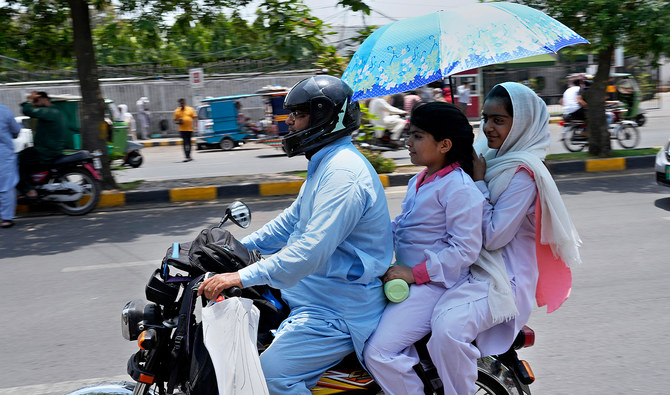
- Some 26 million students will be out of lessons from Saturday in Punjab as temperature soars
- Met Office has forecast three heatwaves, one underway and two set to hit in early and late June
LAHORE, Pakistan: Half of Pakistan’s pupils will be shut out of schools for a week as the nation takes crisis measures to lessen the effect of a series of heat waves, officials said Thursday.
Some 26 million students will be out of lessons from Saturday in Punjab, Pakistan’s most populous province, which has ordered schools to close for the summer break one week early because of the soaring temperatures.
The early closure was confirmed by a spokesperson for Punjab’s Education Department.
Pakistan’s meteorological office has forecast three heat waves — one already underway and two more set to hit in early and late June.
Temperatures in Punjab are currently six to eight degrees Celsius above normal, the disaster management agency said, with the provincial capital Lahore due for 46 degrees Celsius (111 degrees Fahrenheit) at the weekend.
The government’s Coordinator on Climate Change and Environment told journalists in Islamabad on Thursday that “global warming is causing a sudden change in weather patterns.”
Parts of Pakistan are facing power cuts of up to 15 hours as demand for fans and air conditioning surges, leaving students sweltering at their desks.
The Save the Children NGO said the 26 million Punjabi schoolchildren with lessons canceled account for 52 percent of pre-primary, primary and secondary students in Pakistan.
“Prolonged exposure to intense heat impacts children’s ability to learn and to concentrate and this puts their education at risk,” country director Muhammad Khuram Gondal said.
“Excess heat is also potentially lethal to children.”
The UN children’s agency UNICEF said more than three-quarters of children in South Asia — or 460 million — are exposed to temperatures above 35C (95F) for at least 83 days per year.
It warned that children are at risk of “dehydration, higher body temperature, rapid heartbeat, cramps... and coma.”
Pakistan is responsible for less than one percent of global greenhouse gas emissions.
However, the nation of 240 million ranks high among countries vulnerable to extreme weather events, which scientists have linked to climate change.
A third of Pakistan was submerged by unprecedented monsoon rains in 2022 that displaced millions of people.
It was also battered by above-normal rainfall last month that killed at least 144 people in the wettest April recorded since 1961, with more deluges forecast this summer.
Lahore’s students also saw lessons cut this winter when schools were shut as the megacity was enveloped by choking smog.
Pakistani exporters confident of increasing sales in Kingdom after encouraging response at ‘Saudi Food Show’
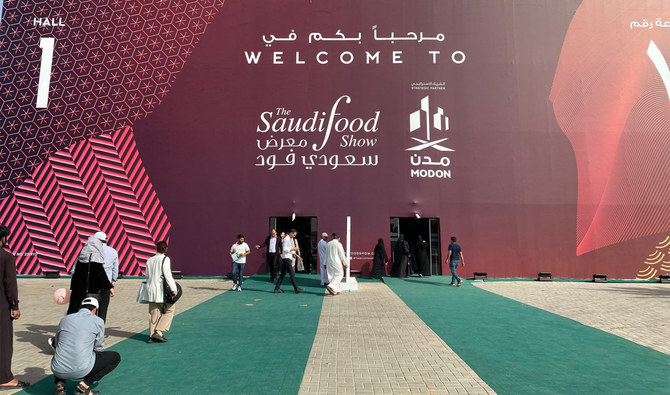
- Saudi Food Show, Kingdom’s largest food and beverages sourcing event, is being held in Riyadh from May 21-23
- Thirty Pakistani companies are among 1,000 exhibitors from over 97 countries taking part in the exhibition
KARACHI: Buoyed by an overwhelming response at the “Saudi Food Show 2024” being held in Riyadh, Pakistani food exporters on Thursday said they were confident of increasing their market share in the Kingdom.
The Saudi Food Show is the Kingdom’s largest annual event for food and beverage sourcing. The event is being held in Riyadh from May 21-23 where over 1,000 exhibitors from 97 countries are taking part in the exhibition. Among the exhibitors are also thirty Pakistani companies that are taking part in the event, the Trade Development Authority of Pakistan (TDAP) said.
“The annual demand for rice in Saudi Arabia is 1.2 million tons and Pakistan’s share is only 7 percent at present,” Chela Ram Kewlani, chairman of the Rice Exporters Association of Pakistan (REAP), told Arab News.
“We are expecting to increase our share after this exhibition.”
The Saudi groundbreaking platform convenes a distinguished global contingent of exhibitors, thought leaders, industry communities, strategic partners, innovative brands, and acclaimed chefs.
The Pakistan Pavilion at the event featured 30 companies comprising 15 from the rice sector, 12 from the processed food sector, two from the meat sector, and two from the dairy sector, the TDAP said.
Pakistani rice exporters hope to achieve a new milestone in exporting the product after India decided last year to ban rice exports.
India, the world’s top rice exporter, banned the export of non-basmati white rice last year to control its rising domestic food costs and maintain domestic supplies.
The move prompted Pakistan’s rice exports to increase by more than 80 percent this fiscal year to $3.28 billion. REAP officials hope rice exports will cross $3.5 billion mark by the end of the current financial year.
Praising the response received at the Saudi Food Show, Khalid Ghori, a representative of the leading Pakistani agribusiness Matco Foods Limited, hoped “the market will be fruitful for Pakistan in the coming days.”
“Large number of people including importers and exporters visited our stalls and we hope that the market will be very fruitful for Pakistani products,” Ghori told Arab News.
Pakistani food exporters also participated in a three-day major food and beverage trade show held last week in Canada’s Montreal.
SIAL Canada featured about 10 Pakistani companies that displayed various products including beverages, dairy products, rice, pink salt, sweet snacks, seafood products, fresh fruits, vegetables, dried fruits, frozen and ready-made products.
Pakistan PM says in UAE to seek joint investments, not loans
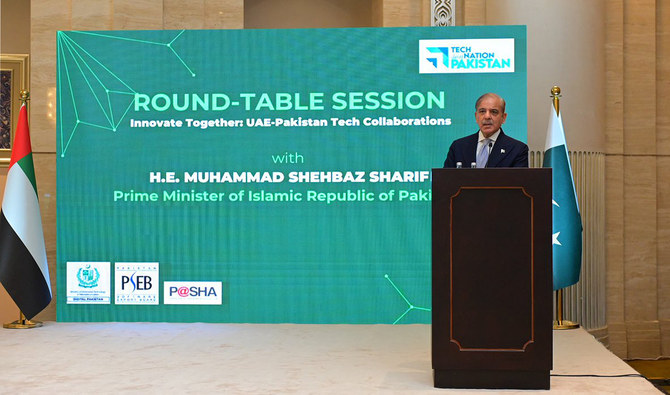
- Pakistan and UAE business representatives sign three agreements in IT, energy and infotech
- UAE one of Pakistan’s closest allies, has frequently financially bailed out South Asian nation
ISLAMABAD: Pakistani Prime Minister Shehbaz Sharif said on Thursday he was on a day-long visit to the United Arab Emirates (UAE) not to seek loans but to explore opportunities for joint investment and collaboration that would pave the way for “mutual benefits” for both nations.
Sharif arrived in Abu Dhabi on Thursday with a high-level delegation amid a concerted push by Pakistan to seek foreign investment as it navigates a challenging path to economic recovery. Sharif is scheduled to meet UAE President Sheikh Mohamed bin Zayed Al Nahyan in Abu Dhabi later today, Thursday.
The UAE is one of Pakistan’s closest allies and has frequently bailed out the South Asian country, joining Saudi Arabia and China in rolling over billions of dollars of loans to Pakistan last year to help it clinch a last-gasp deal with the International Monetary Fund (IMF) and avoid a sovereign debt default.
The UAE is Pakistan’s third-largest trading partner, after China and the United States. Policymakers in Pakistan consider the Gulf state an optimal export destination due to its geographical proximity, which minimizes transportation and freight costs while facilitating commercial transactions. The UAE is also home to more than a million Pakistani expatriates and the second-largest source of remittances to the South Asian country, after Saudi Arabia.
“Today I am here in this great country, this great brotherly country, not to seek loans but to seek joint collaboration, seek joint investments, which have mutual benefits … for the investor, and draw dividends through hard work, ingenuity, and by using modern tools and skills,” Sharif said at a roundtable conference where leading Pakistan and UAE businesses signed three agreements on information technology, energy and infotech.
Sharif said Pakistan, a country of 241 million people, offered great potential for investors, with a majority of its population comprising people aged between 15-30 years.
“We want to provide the highest quality vocational training and empower our youth with modern skills so that they can come to UAE, to Abu Dhabi, to Dubai, and by fulfilling legal formalities, open their offices here,” the PM said.
Sharif said his government wanted to support Pakistani small and medium enterprises so they could provide their services through a remote mechanism in the UAE.
“I call you great ambassadors of Pakistan, but this is not enough,” Sharif said, referring to Pakistani businesses. “You have to learn from now the expertise and experience of our Emirati brothers and sisters.”
Pakistan has seen a flurry of foreign visits in recent weeks, including by the now deceased Iranian president, the Saudi foreign minister, a delegation of top Saudi companies as well as officials from Qatar, China, Japan, Turkiye and Central Asian countries, among others.
Reeling from high inflation, low forex reserves, and an unstable currency, Sharif has vowed to steer Pakistan out of its prolonged economic crisis by enhancing bilateral trade with allies and attracting more international investments. Islamabad is also currently in talks with the IMF to secure a new, longer-term bailout package of at least $6 billion.
Pakistan’s main health body warns of Congo fever risk ahead of Eid Al-Adha
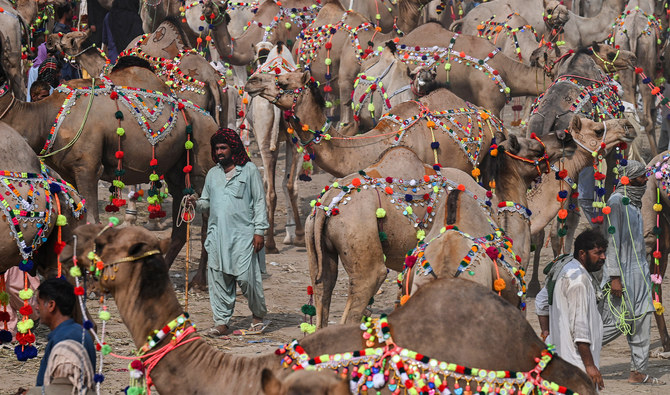
- Congo fever is viral hemorrhagic disease transmitted to humans through contact with infected animals
- NIH also urges timely and appropriate measures to ensure protection from heatstroke and typhoid fever
ISLAMABAD: Pakistan’s primary health body has issued an advisory for the prevention of Crimean-Congo hemorrhagic fever (CCHF), a press release said on Thursday, in light of the upcoming Muslim festival of Eid Al-Adha that could be a breeding ground for the tick-borne virus.
CCHF is a viral hemorrhagic disease transmitted to humans through contact with infected animals, mainly through handling livestock or their blood, tissue, or excrement. It can also be transmitted from human to human through direct contact with the blood or bodily fluids of an infected person. The disease has a high fatality rate, and there is currently no vaccine or specific treatment for it.
“During Eid Al-Adha, there is an unusual increase in the movement of animals from all provinces and increased contact between the general public and animals, raising the risk of the spread of Congo fever,” the National Institute of Health (NIH) said on Wednesday, advising people to wear light-colored clothing to easily detect ticks on fabric and avoid areas where ticks were prevalent.
The NIH also urged timely and appropriate measures to ensure protection from heatstroke and typhoid fever.
Pakistan has been experiencing severe climatic changes due to global warming in recent years which has led to heat waves, untimely rains and droughts.
A sunstroke is a form of hyperthermia and medical emergency during which the body temperature is elevated and can be fatal if not promptly treated, the health body said, adding that profuse or no sweating, dry skin, headaches, chills, slurred speech and dizziness were common signs of heatstroke.
Emphasizing precautionary measures during extreme heat, the health advisory advised people to avoid direct sunlight, drink plenty of water and use an umbrella or hat when outdoors.
On May 21, authorities had urged people to stay indoors as the country was hit by an extreme heat wave that threatens to bring dangerously high temperatures and yet another round of glacial-driven floods. Pakistan’s most populous province, Punjab, shut all schools for a week because of the heat, affecting an estimated 18 million students.
The country’s chief meteorologist has warned that the heat wave would “intensify” from today, May 23, onwards.
Regarding typhoid fever, a bacterial infection that can prove to be life-threatening if not treated properly, the NIH said Pakistan was among countries with the highest burden of typhoid fever due to a lack of safe drinking water, inadequate sanitation, and poor hygiene practices.
The statement stressed the importance of following hygiene practices, using clean water and avoiding street food. The disease has been reported from various parts of the country since 2016, especially during the monsoon and summer seasons, the health advisory said.
Pakistan court reserves verdict on pleas against ruling Imran Khan, wife violated marriage law
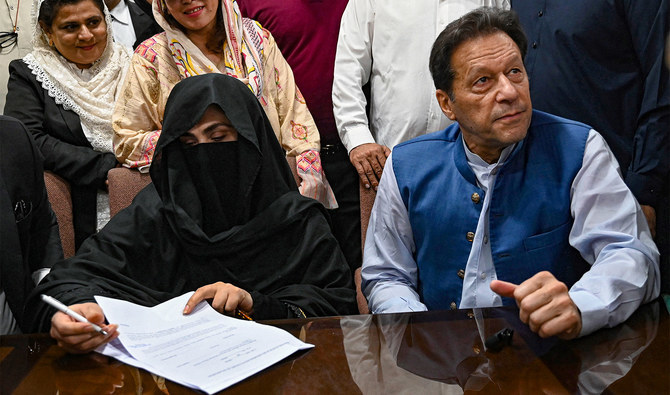
- Khan, wife Bushra sentenced to seven years in prison in February by court that ruled their 2018 marriage illegal
- Bushra is currently serving out two prison sentences at Rawalpindi’s Adiala Jail where Khan is also incarcerated
ISLAMABAD: A district and sessions court in Islamabad on Thursday reserved its verdict on appeals challenging seven-year jail sentences each for former Pakistani Prime Minister Imran Khan and his wife Bushra Khan for violating the country’s marriage law.
Khan and his wife were sentenced to seven years in prison and fined in February by a court that ruled their 2018 marriage broke the law. Bushra was accused of not completing the waiting period mandated by Islam, called “Iddat,” after divorcing her previous husband and marrying Khan.
The Khans signed their marriage contract, or “Nikkah,” in January 2018 in a secret ceremony seven months before the former cricket superstar became prime minister for the first time. There was controversy over whether they had wed before the Iddat period was complete. After initial denials of the marriage, Khan’s Pakistan Tehreek-e-Insaf confirmed it weeks later.
The Khans both deny wrongdoing.
“The court will announce the judgment on May 29 (Wednesday),” Pakistan’s Express Tribune newspaper reported. Other Pakistani media also widely reported that the judgment would be announced next week.
Bushra is currently serving out two prison sentences at Adiala Jail where Khan is also incarcerated. In January, both were sentenced to 14 years in prison in a case that relates to accusations they undervalued gifts from a state repository and gained profits from selling them while Khan was prime minister from 2018-22.
CASES
Khan was first jailed after being handed a three-year prison sentence in August 2023 by the Election Commission for not declaring assets earned from selling gifts worth more than 140 million rupees ($501,000) in state possession and received during his premiership. In January, Khan and Bushra were handed 14-year jail terms following a separate investigation by the country’s top anti-graft body, or NAB, into the same charges involving state gifts.
An anti-graft court in Islamabad also handed Khan a 10-year jail term in January for revealing state secrets, a week before national elections on Feb. 8. The ruling on his marriage to Bushra and a seven-year sentence each for both also came ahead of the polls.
Khan has also been indicted under Pakistan’s anti-terrorism law in connection with violence against the military that erupted following his brief arrest related to a land graft case on May 9. A section of Pakistan’s 1997 anti-terrorism act prescribes the death penalty as maximum punishment. Khan has denied the charges under the anti-terrorism law, saying he was in detention when the violence took place.
Khan’s convictions, which mean he is banned from holding public office, ruled the 71-year-old out of the February general elections. Arguably Pakistan’s most popular politician, Khan says all cases against him are motivated to keep him out of politics.
SPIRITUAL LEADER
Bushra’s ex-husband, Khawar Maneka, to whom she was married for about 30 years, brought a criminal complaint against the Khans.
Khan has often called Bushra his spiritual leader. She is known for her devotion to Sufism, a mystical form of Islam.
Born Bushra Riaz Watto, she changed her name to Khan after her marriage. Her husband and followers commonly refer to her as Bushra Bibi or Bushra Begum, titles that denote respect in Urdu.
Khan’s two previous marriages — to Jemima Goldsmith, daughter of tycoon James Goldsmith, and television journalist Reham Nayyar Khan — ended in divorce.










